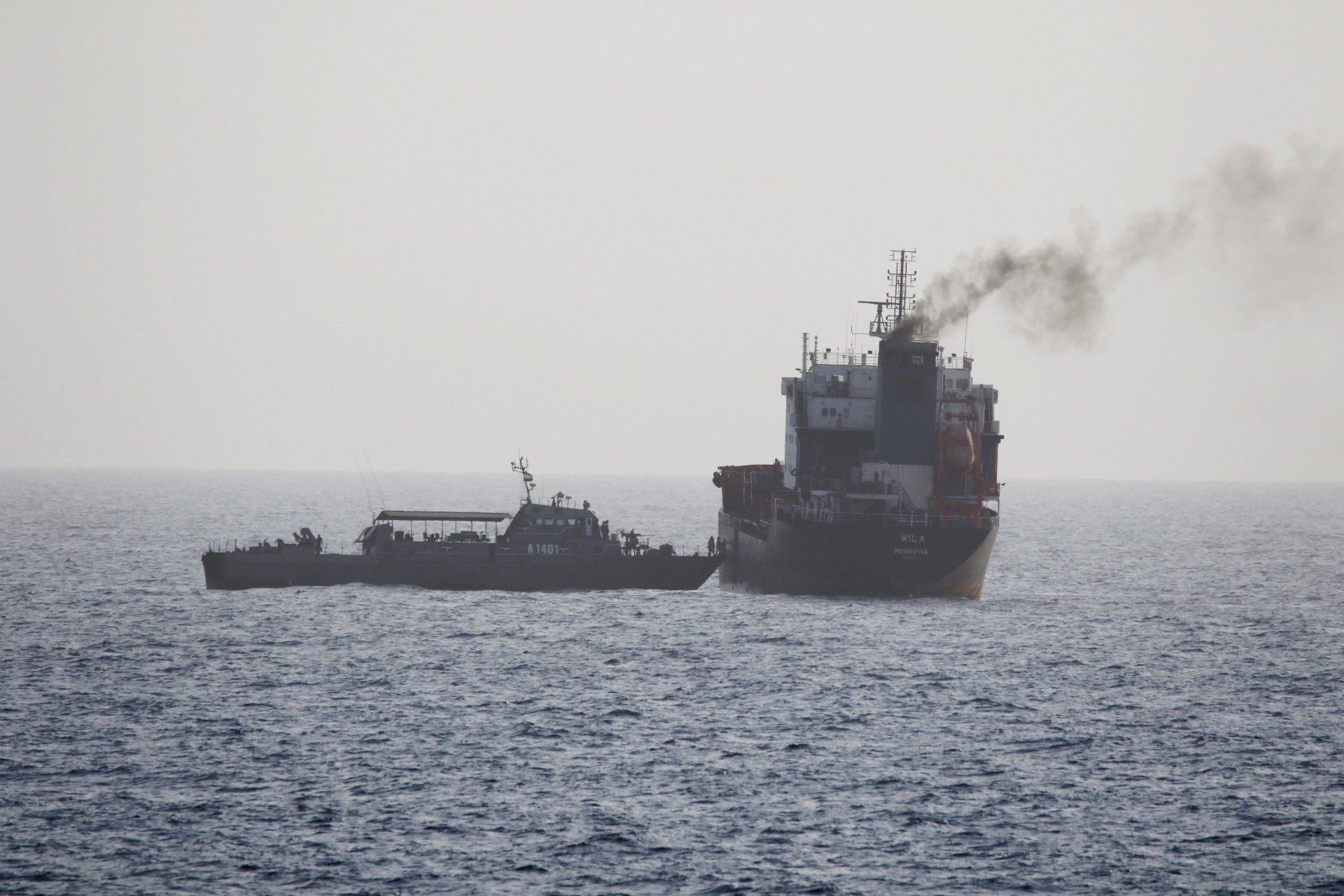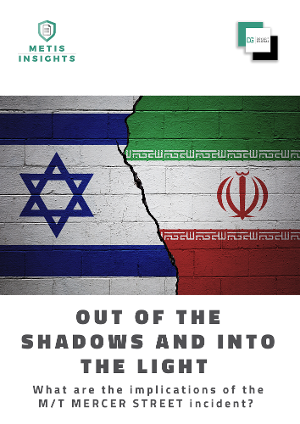4 min read
By targeting civilian ships, Iran ‘had last word’ in sea shadow war with Israel
By: Jewish News Syndicate on January 27, 2022 at 8:00 AM

Professor Rear. Admiral (Ret.) Shaul Chorev tells JNS that Israel needs a more thought-out strategy when it comes to dealing with the Iranian threat at sea, as well as combat that has become “increasingly asymmetric.”
The Israeli Navy has played a crucial role in Israel’s ongoing shadow war against Iran, but the events of the past months indicate that Jerusalem needs to rethink its long-term strategy on how to target certain Iranian activities, a maritime strategy expert has said.
Professor Rear Admiral (Ret.) Shaul Chorev, head of the Haifa Research Center for Maritime Policy and Strategy at the University of Haifa, told JNS that when it comes to the navy’s purported sea shadow war with Iran, it is important to distinguish between two types of activities. The first involves reported missions to disrupt Iranian weapons smuggling at sea—a line of activity that Chorev described as imperative for Israel to pursue. The second, however, was the reported campaign targeting Iranian oil tankers that were delivering oil to the Bashar Assad regime in Syria.
“The navy reportedly conducted some highly daring and impressive operations, but one does not judge these things based on operational capability alone,” said Chorev, a former Israel Navy submarine and missile-boat flotilla commander, and the first project manager of Dolphin submarines who was stationed at German shipyards ThyssenKrupp, which manufacturers the submarines.
In its annual summary for all three of its branches, the Israel Defense Forces said the navy conducted around 100 operations in 2021, “including dozens of special operations,” without going into detail.
“Determining success means looking at the strategic measure of effectiveness,” said Chorev. “For example, submarine commanders learned at the closure of World War II that hitting Japanese merchant ships, rather than warships, would be more decisive. The Japanese were desperate for raw materials, and someone had to instruct the submarine fleet that the main mission was destroying the merchant ship in order to hit the Japanese economy.”
Using strategic impact as the main test of results, Chorev wondered whether reports of Israeli operations that allegedly targeted Iranian oil tankers heading for Syria were effective in economically harming Iran and act as an influential factor in suspending its nuclear program.
In examining Tehran’s retaliation, Chorev noted that four civilian vessels with links to Israeli businesspeople were hit in response. “Israel stopped this part of the shadow war in the end. After the July 2021 attack on the Mercer Street oil tanker vessel [killing two European crew members on board], Israel abandoned the military channel and went instead for the diplomatic channel, recruiting the United States and the international community. This looks like a justified decision,” assessed Chorev.
While there is “no question” that operations to stop Iran’s Islamic Revolutionary Guards Corps from smuggling weapons via the sea to Hezbollah in Lebanon or Hamas in Gaza is the right course of action, he argued, the reported campaign hitting the oil tankers from Iran did not achieve much in terms of pressuring Iran economically, especially since China is buying 51% of Iranian oil (directly or circuitously) at this time, despite U.S. sanctions. If the attacks were designed to disrupt an Iranian mechanism to fund Hezbollah via Syrian oil sales, that also proved short-lived, according to Chorev.
“In my view, those who had the last word here were the Iranians. They challenge our freedom of navigation in the Gulf of Aden, and it appears as if we stopped our activities to target Syria-bound tankers. Russia also entered the picture, saying it would guard Iranian oil tankers. The result was that strategically, a new maritime front was opened, distant from Israel and out of the operational capabilities of the Israeli Navy,” he concluded.
‘Adversaries are becoming hybrid—part-terror, part-military’
Beyond the shadow war, Chorev has been observing annual joint Iranian Chinese and Russian naval exercises, viewing them as a part of the diplomatic component of Iran’s maritime strategy. The exercises reflect the formation of a Russian-Chinese axis supporting Iran politically at the height of the period in which it is being pressured to return to the nuclear agreement, and it is subject to economic and political sanctions by the West.
“The exercises are saying to the Americans, ‘you left the nuclear agreement, and we want to say this was not legitimate,’ ” said Chorev.
Two ships of the Islamic Republic of Iran Navy started sailing from the Port of Bandar Abbas in May 2021, passed the Atlantic Ocean, reached the Gulf of Finland, and took part in the biggest Russian naval parade on July 25. “The participation of the Iranian ships in Russia’s parade is a sign of strengthening relations between the two countries,” said Chorev.
Meanwhile, China “has turned into the biggest investor in Iranian infrastructure and energy,” he noted. “There’s a good reason why the Iranian foreign minister visited China and was received with an honor guard. This was not just a diplomatic event. Iran can serve China as a supply source of fuel and natural gas, and Iran can benefit from China in its economic development.”
Separately, Chorev drew attention to the fact that the nature of naval combat has changed significantly in the Middle East since the days of the 1973 Yom Kippur War—the last time that the Israeli Navy clashed with other state navies.
The Israeli Navy is increasingly taking on a ‘constabulary’ role by protecting Israel’s economic waters and offshore gas drilling rigs, and it is increasingly playing a role in Israel’s diplomatic-strategic signaling by holding joint exercises with the U.S. Fifth Fleet, just as Iran has been doing with China and Russia.
This type of coalition-building activity and increased Israeli military cooperation with friendly Sunni states, such as the United Arab Emirates and Bahrain as a result of the 2020 Abraham Accords, bring advantages, said Chorev, particularly in longer-range issues where Israel would require American assistance at sea.
Although the cooperation in question is not as tight as other coalition systems such as the trilateral AUKUS pact between the United States, the United Kingdom and Australia, the increased cooperation with the Fifth Fleet is an “important development,” he added.
Along other lines, he noted, “combat is becoming increasingly asymmetric. We saw this in the Second Lebanon War. Activities are increasingly focused on coastal areas. Adversaries are becoming hybrid—part-terror, part-military—such as the Houthis in Yemen. The navy finds itself coming up not against an enemy fleet, but against an adversary that lacks a clear return address,” he cautioned.
Nevertheless, Israel’s submarines continue to play the critical role of acting as the country’s “strategic depth,” he said. “All of these and other issues not mentioned in this interview require Israel to soon develop and formulate a coherent maritime policy and strategy for its maritime domain, which is evident in its absence today.”
Related Posts
Israeli Navy to procure four SHALDAG MK V vessels
The SHALDAG MK V IN is one of the three variants of the SHALDAG-class fast patrol boats.
IRGC Navy Warns Arab States Against Cooperation..
Since 1995, the Islamic Revolutionary Guard Corps navy has been tasked with guarding “the Persian..
It’s the Terrifying Question: Will the War Spread..
Recent developments in the Hamas-Israel conflict have raised concerns about the potential for a..





